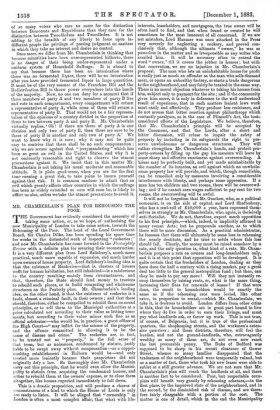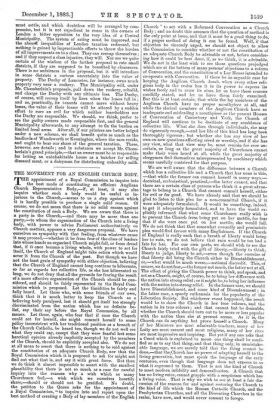MR. CHAMBERLAIN'S PLAN FOR REHOUSING THE POOR. T HE Government has
evidently considered the necessity of taking some action, or, as we hope, of authorising the new Municipality of London to take some action, towards the Rehousing of the Poor. The head of the Local Government Board, Sir Charles Mike, has been spending his spare time for weeks in the distasteful work of inspecting "rookeries ;" and now Mr. Chamberlain has come forward in the Fortnightly Review with a definite plan for securing their reconstruction. It is a very different plan from Lord Salisbury's, much more practical, much more capable of expansion, and much harder upon owners of house property. Lord Salisbury's leading idea is that the existence of Rookeries—that is, clusters of houses unfit for human habitation, but still inhabited—is a misfortune to the country resulting mainly from circumstances, and that, therefore, the State should lend money to trustees to rebuild such places, or to build competing and wholesome structures on the Peabody plan. Mr. Chamberlain's leading idea, on the other hand, is that the existence of rookeries is a fault, almost a criminal fault, in their owners ; and that these should, therefore, either be compelled to rebuild them on sound principles, or to sell them to the Municipal authorities at a ,price calculated not according to their value as letting tene- ments, but according to their value minus such fine as an official arbitrator—who would be, in practice, a great officer of the High Court—" may inflict for the misuse of the property, and the offence committed in allowing it to be the cause of disease and crime." The rookeries are, in fact, to be treated not as "property," in the full sense of that term, but as nuisances, condemned by statute, justly liable to be swept away withcut compensation--as a copper- smelting establishment in Holborn would be—and only treated more leniently because their proprietors did not originally defy a law. So thoroughly does Mr. Chamberlain carry out this principle, that he would even allow the Munici- pality to abstain from acquiring the condemned houses, and either to rebuild them at the owners' expense, or to close them altogether, like houses expected immediately to fall down.
This is a drastic proposition, and will produce a chorus of remonstrances of a kind to which the House of Lords is only too ready to listen. It will be alleged that " ownership " in London is often a most complex affair, that what with life- interests, leaseholders, and mortgagees, the true owner will be often hard to find, and that when found or created he will sometimes be the most innocent of all concerned. If we are not mistaken, Lord Hanmer was once attacked in the Press very severely for neglecting a rookery, and proved con- clusively that, although the ultimate "owner," he was as powerless in the matter and as irresponsible as any writer who assailed him. It will be necessary often to extend the word "owner," till it covers the jobber in houses ; but with that reservation, we see no injustice in Mr. Chamberlain's proposal. The man who lets an uninhabitable house for profit is really just as much an offender as the man who sells diseased meat, or opens an unhealthy factory, or starts a trade dangerous to the neighbourhood, and may fairly be treated in the same way. There is no moral objection whatever to taking his houses from him, subject only to payment for the site ; and if the community gives him more, it is only in deference to the well understood result of experience, that in such matters lenient laws work most easily and effectively. They produce less resistance, and do not arouse that bitter reaction against philanthropy which contently paralyses, as in the case of Plimsoll's Act, the best- considered efforts of the Legislature. We believe, therefore, that Mr. Chamberlain's principle will be accepted by the Commons, and that the Lords, after a short and bitter discussion, will refuse to impair the safety of property by including in its safeguards the right to pre- serve unwholesome or dangerous structures. They will rather strengthen Mr. Chamberlain's hands, and protect pro- perty-owners by filling up the gap his measure will leave by some sharp and effective enactment against overcrowding. A hOtise may be perfectly built, and yet made uninhabitable by the number of its inmates, an evil against which no unwhole- some property law will provide, and which, though remediable, can be remedied only by measures involving a considerable interference with liberty, and perhaps some oppression. If a man has ten children and two rooms, there will be overcrowd- ing; and if he cannot earn wages sufficient to pay rent for two rooms, the overcrowding will be awful.
It will not be forgotten that Mr. Goschen, who, as a political economist, is on the side of capital, and Lord Shaftesbury, who has a rent-roll of £40,000 a year, have expressed them- selves as strongly as Mr. Chamberlain, who, again, is decisively anti-Socialist. We do not, therefore, expect much opposition to his first principle,—which, indeed, is implicitly affirmed in many recent Acts ; but he propounds another, as to which there will be more discussion. As a practical administrator, he foresees that there will ultimately be some loss in rehousing the nearly destitute, and he tries to settle where this lose should fall. Clearly, the money must be raised somehow by a rate, and the only question is, what kind of a rate. Mr. Cham- berlain proposes a rate on owners and long-leaseholders only, and it is at this point that opposition will be developed. It is quite certain that the freeholders of London, dealing as they have done for half a century with a rising market, pay a great deal too little to the general metropolitan fund ; but then, can they be made to pay any more ? Will they not instantly re- coup themselves by raising rents, or, what is the same thing, increasing their fines for renewals of leases ? If that were done, the result to householders would be exactly the same as if the rehousing rate were levied, like other rates, in proportion to rental,—which Mr. Chamberlain, we take it, is desirous to avoid. London differs from other cities in this, that its householders use in great part bound to live where they do live in order to earn their livings, and must pay what landlords ask, or throw up work. This is not true, of course, of Belgravia, but it is true of the professional quarters, the shopkeeping streets, and the workmen's exten- sive guartiers ; and these districts, therefore, will feel the burden, and not the ground-landlords, who, extravagantly wealthy as many of them are, do not even now exact the last procurable penny. The Duke of Bedford was supposed to be sharp in his recent clearance of Gower Street, whence so many families disappeared that the tradesmen of the neighbourhood were temporarily ruined, but as a matter of fact, those who took his new leases were able to sublet at a still greater advance. We are not sure that Mr. Chamberlain's plan will reach the landlords at all, and there is another fact to be considered. Poor, but respectable occu- piers will benefit very greatly by rehousing schemes,—in the first place, by the improved state of the neighbourhood, and in the second, by the diminished risk of disease, and are there- fore fairly chargeable with a portion of the cost. The matter is one of detail, which in the end the Municipality
must settle, and which doubtless will be arranged by com- promise, but it is not expedient to rouse in the owners of London a bitter opposition to the very idea of S Central Municipality. The system of rating must be improved, and the absurd inequalities of London taxation redressed, but nothing is gained by impracticable efforts to throw the burden of all improvements on to a class. They can recoup themselves ; and if they suspect a class injustice, they will. Nor are we quite certain of the wisdom of the farther proposal to rate small districts, if they are supposed to be benefited by clearances. There is no unfairness in the proposal, but it will introduce in some districts a curious uncertainty into the value of property. The Duchy of Lancaster, for instance, owns much property very near a rookery. The Municipality will, under Mr. Chamberlain's proposals, pull down the rookery, rebuild, and charge the Duchy with any ultimate loss. The Duchy, of course, will recoup itself by fines when the leases fall in ; and as, practically, its tenants cannot move without heavy losses, the value of their leases will be altered by a sudden effort to cure an evil for which neither leaseholders nor the Duchy are responsible. We should, we think, prefer to see the guilty owners made responsible first, and the general Municipality afterwards, to any attempt to fix the burden on limited local areas. After all, if our printers are better lodged under a new scheme, we shall benefit quite as much as the landlords of Wandsworth or Kennington, where the men reside, and ought to bear our share of the general taxation. These, however, are details ; and in substance we accept Mr. Cham- berlain's grand principle,—that an owner must be as responsible for letting an uninhabitable house as a butcher for selling diseased meat, or a dairyman for distributing unhealthy milk.







































 Previous page
Previous page